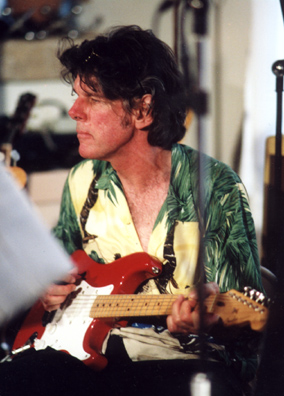

The following is an interview with Peter Lewis conducted via email in October 2001.
1. I have read that you have been compared as the 'Paul McCartney of Moby Grape' - have you heard this comparison before?
No, I haven't heard that one. However, I have heard Moby Grape compared to the Beatles and presuming that it was some kind of musical comparison that was made, I would be interested in how someone thought me like Paul.
I already know that we both loved Linda, who I met when Moby Grape was in New York about a year before she became Linda McCartney. Not only did she help me through a tough time in my life, she turned me on to some great artists like Tim Hardin and Freddy Neal who became big influences in my music. On the off chance that Paul might see this, I should also add that Linda and I were just good friends. To spite the fact that I had to find a different place to stay in New York when she left, I was glad when she got married. In the end, this has always seemed to me like one of the few happy endings from the saga of the sixties.
2. In the 60s, did Moby Grape ever appear on the same bill as the Electric Prunes?
No, to my recollection Moby Grape and the Electric Prunes never played on the same bill in the sixties. Being that we played with everyone else imaginable, it seems unlikely that we never met up. Yet as I said, it is only my recollection that we never played together. It is possible that an Electric Prunes / Moby Grape gig did take place sometime amid the haze that surrounded us in those years. I just may not remember it. However, since the Electric Prunes are not sure either, to quote Mark Tulin, at least as far as the sixties is concerened it still proves one thing, we were all there.
3. How did you know the band members of the Electric Prunes?
I met the Electric Prunes (James and Mark first) at a party given by the Lowes at their house. I was invited by James' wife Pam. She had seen me at a local gig that I did with Sam Andrew (from Big Brother and the Holding Company). Anyway, I suppose she saw a kindred spirit in me because a month or so later she called about the party where I met James and Mark. I liked them both immediately.
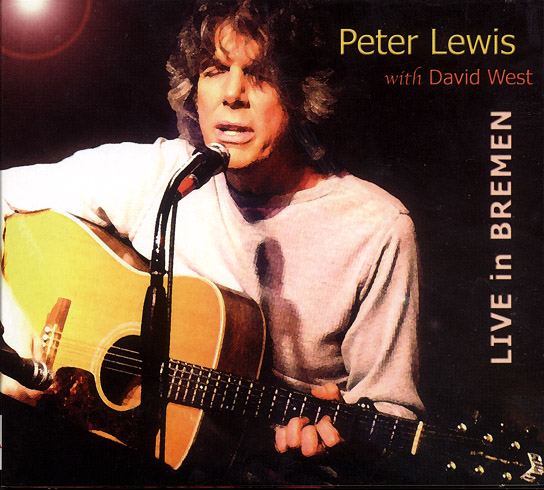
4. How did you get to record with the reformed Prunes?
I don't remember if there was any talk about playing on the record that first night. Maybe I heard a "hey man, lets get together and jam sometime" between drinks. I do recall, however, meeting a lot cooler bunch of people than would ordinarily be hanging around the Santa Ynez Valley where we live. They were artists, actors and record producer types (mostly imports from L.A.). What's more, I found out that James and I had both gone to the same high school. In the end, for the first time since the beginning of Moby Grape, when my mother told me to cut my hair or get out of her house, it was like being with the kind of people I had grown up with. Meeting the Lowes had given me a sense of having completed some kind of karmic circle. Although I still don't totally understand this, I wasn't surprised when I got a call from James to put some guitar parts on a few tracks he had recorded.
5. What was it like to record with the band?
My first outing in the studio was with James only. It was relaxed and involved putting slide guitar on a Ry Cooder song called 'Alimony'. After that, there was a short period of over dubbing guitar parts on several other previously recorded tracks. At one point, when I showed up at the studio, I found Mark and Mike (Quint) there. That began a series of weekend recording sessions at which live tracks were cut. At this stage, rather than trying to orchestrate the music, once a basic structure was set, the music sort of seemed to create itself. Eventually, once we had dealt with their back log of songs, the emphasis shifted from determined solutions to experimentation. For example one Sunday afternoon, we did a truly soulful version of Amazing grace that seemed to just materialize out of thin air. We were running down another song at the time, 'Just like Tom Thum's Blues' by Dylan. Suddenly the progression morphed and we were playing Amazing Grace. I remember looking over at a picture of my mom that Pamela Lowe had hung on the wall of the studio. Mom, who has passed away since then, was in the hospital at the time. Strangely, our version of Amazing Grace was the last bit of music she heard. I had made a tape copy of the song and played it for her in the hospital just a few days before she died.
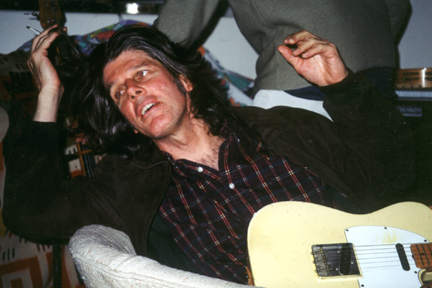
6. Did you get involved in writing any material whilst recording with them?
Yes, but because this involved various members of the band working together in different combinations at separate times, at a certain point I think for all of us it became a little difficult to remember who contributed what. Because of this, with the exception of ''Hollywood Halloween'', for which I was the primary writer of the words, I would rather leave exactly ''who wrote what '' up to James and the rest. None the less, I can tell you that although I had nothing to do with the lyrics on any of the other tunes, there were times during the process when I would sit around with James in his studio during the week jamming on a lick while he adlibbed a vocal. At least from my perspective, several of these sessions became the seeds that grew into completed songs later when Mark would come up on the weekend.
7. How would you describe the music of the band in 2001 compared to what you hear of them in the 60s?
First of all, I should mention that the Electric Prunes and Moby Grape were only casually aware of each other in the sixties. This we discovered in the beginning when I met James and Mark at the ''party''. Furthermore after that, from the point I started playing with them until the project was about a year down the road, as I recall neither of us played our old music for the other. The effect this had was to keep the tyranny of our separate musical pasts from effecting the work.
At some point, however, there was an offer to play live that involved learning some of the old Electric Prunes songs. I first heard them on a tape James made for me - 'Too much to dream', 'Get me to the world', 'I happen to love you'.
My first impression was that this music sounded early sixties English. I could definitely hear the influence of the 'Stones', 'Them' and some of the other more blues based pop bands that showed up right after the Beatles. In comparison, the new stuff seems to me far more eclectic, especially in the sound dept. The same sub-cultural elements are there, but it's like they have been smuggled into the new millennium. I say this suspecting for Electric Prunes fans, listening to 'Artifact' will be even more of a journey (covers more ground and yet still comes full circle) than listening to their older works.
8. How would you describe the difference between the music scene in LA compared to SF in the 60s?
For me personally, the big difference was that I couldn't seem to get anywhere near the original music scene in L.A. Maybe this was because I grew up in Hollywood and it had a hard time taking me seriously (or visa versa). None the less, I had been playing music there since my freshman year in high school. I must have played every low end bar from Gazzarri's on the Strip, to the Hollywood bowl, (as in bowling, not to be confused with the famous concert venue). Anyway, by the time I headed north, it was my last resort. All I knew is that I couldn't play one more cover tune for one more sloppy drunk.
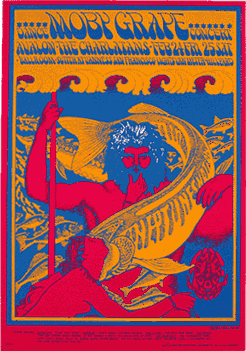
But when I got to S.F. I found others like myself. Refugees from club circuit scenes all over the U.S. come to regroup into what would hopefully become one winning combination or another. In the end, Moby Grape was one of these. I don't know if we had met in L.A. what our fate would have been. I do know that there was no ballroom scene in L.A. to showcase new bands. Furthermore the political climate to which music was becoming inextricably linked, was far more progressive in S.F. than in L.A. For example, as you probably know the Buffalo Springfield song 'For What it's Worth' was written about one particularly violent confrontation perpetrated by the cops against the 'hippies' who were beginning to gather in ever greater numbers on the Sunset strip. This would never have happened in S.F. If the police had wanted to raid the counter culture, they had ample opportunity every Friday, Saturday night and Sunday afternoon at the Fillmore auditorium or Avalon ballroom where thousands of kids and other dropouts were smoking pot with impunity all weekend long. This atmosphere of liaise faire in S.F. made it a far more agreeable place than L.A. to 'turn on, tune in and drop out'. Consequently, when the real migration of disenfranchised youth began, it was to San Francisco. In my opinion, S.F. rock bands played a large part in this process, invoking a promise of freedom in their life styles and music that more directly reflected the social context in which it was taking place. L.A., on the other hand, was rock star land, a place you went to make records and do your music business. None the less, it has always amazed me that there were some very cool bands that came out of L.A in the sixties. Obviously the Electric Prunes was one of them. But unhappily, there were also many others like the 'Monkeys', 'Paul Revere and the Raiders' and so on that for me more nearly typify the kind of commercialized 'hip' that L.A. was noted for producing at that time.
9. How did recording with the Electric Prunes in 2001 compare to recording with Moby Grape in the 60s?
In the end, I can say that the Electric Prunes was alot more of an existential experience than Moby Grape. I say this because in my opinion, Moby Grape was more of a product, or performance oriented band and while we served a definite musical purpose, I always wished we could have documented our journey in a way that was a little less pre-conceived.
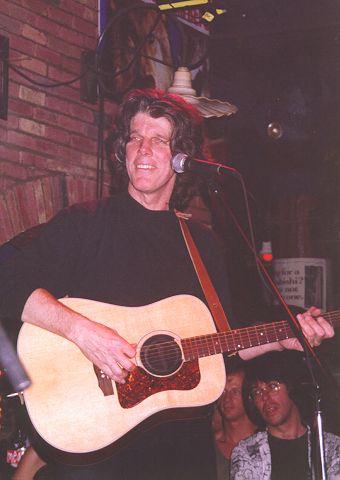
10. Where did the idea of your new single - 'Hollywood Halloween' - came from?
The whole thing began a year ago last Oct. 31st. James and Pamela had taken me to a costume party in L.A. It was at record producer David Katznelson's house, the host who 'broke in and said everyone in line' etc. I was supposed to be a doctor, ('doctor Peter, gynecologist to the stars'). My costume was a plain white shirt, put on backwards (buttoned up in back) so from the front it was supposed to look like a doctor's smock. To make sure everybody knew that, I also wore a dust mask around my neck. Pamela was a mouse ('the country mouse') and James was her 'cowboy husband'. Having eaten several herb cookies on the long ride down, the three of us were well in the zone, as they say. Anyway by the time we reached Katznelson's house in the Hollywood Hills, no other guests had arrived yet.
Perhaps I should interject at this point that I have never craved costume parties. This is especially true if I haven't driven myself and can't leave at will when I don't know ninety five percent of the people there, (like that night). Maybe it's due to an over active imagination, but it has always freaked me out when there is no point at which people wearing disguises stop trying to 'stay in character'. Obviously there is some correlation between this behavior and how much time and money each person has put into their 'facade'. This is understandable. But as the night wears on, the effect it has is to divide the costume party up into two groups. One will include the realists who are dressed to the teeth, down to the last detail of elaborate makeup and wardrobe. To the others like me, the costume is a mere afterthought, like a password one needs to gain entry with and the less said the better. Anyway, I immediately began to suspect that my group would be in the minority (and I was right) when Katznelson opened the door decked out as Satan, complete with horns breaking through two patches of festering flesh on his forehead and a tail of startling realism that protruded from behind. As the night wore on, I thought I saw this tail twitch involuntarily a few times as if it had a life of it's own. I don't mind telling you that, considering my history in the music business, this freaked me out a lot.
Anyway, one thing led to another and ended up pretty much as it unfolds in the song. That is at least what I remember of it.
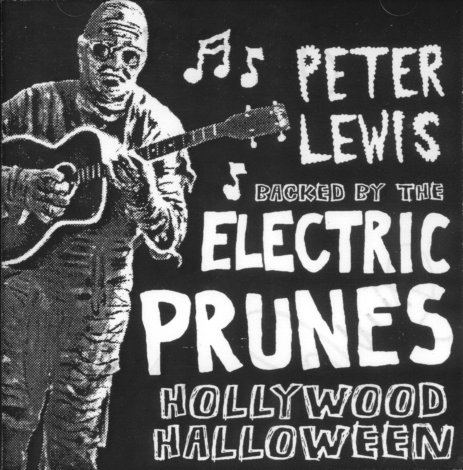
11. Are you likely to do any further collaborations with the Prunes?
I don't see how this can be avoided. There is too much potential there left to be explored. For example, I heard something in James's voice during the Artifact sessions that I haven't stopped thinking about since. This happened at some point after 'All About Wires' and 'Amazing Grace' had been completed. Presuming you have heard these two, you will probably understand what I mean when I say that James expressed in his performances a unique ability to examine himself both as the craven hedonist and the exhausted sinner, humbled and seeking forgiveness. Furthermore, because i believe that art imitates life, I am convinced that this is not an act. Anyway...that's why we love the guy right? Lately I have been working on something for James's voice designed to capture both sides of his character in one song. So far it is a story about a street person who hits on passers by for spare change. But by his dialogue we can see that it is still far from clear whether he already has, ever will, or even should finally deal with the conflict between the temptation and forbearance that rages in his soul. In the sense that this is the same conflict that afflicts each of us, he is a metaphor to all. So far, this is what it looks like. Imagine the music as a slower laid back shuffle, played somewhat in the style of 'Midnight Mile' by the Stones.
12. I have read somewhere that you have had a commercial success over here in Europe (Germany) - how about a tour with James and the gang as I'm sure the Europeans would love to see that?
Since question 13 deals with performing as a Prune, I am presuming by this question that you mean playing on the same bill and not in the same band. First of all as you say, I did a solo album (CD) for Taxim records, a German label. Happily it got a five star review from Rolling Stone (the German edition) and this resulted in some good sales. Also, I could tell by my German BMI statements that they had been playing one song in particular from the CD on the radio 'Beyond the Storm'. However, this all happened a while ago and I'm not sure how much good will is still connected to my name over there.
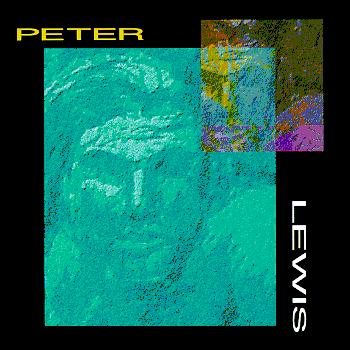
Nonetheless, over here, I have been playing solo gigs for the past several years. Some of these I do alone, some with just another guitar player and some with a band which includes Tiran Porter from the 'Doobie Bros.' on bass and drummer Jimmy Preston from the 'Sons of Champlin'. Just for trivia sake, my last gig was a month ago at a benefit for the New York firemen. Interestingly, I ran into English rocker Jackie Lomax there and learned that he sang one of the harmony parts on 'Dear Prudence'. I also found out since from Mark Tulin that Jackie, along with James Taylor was one of the first people to be signed to Apple records. I had been thinking about The Beatles, especially since George died, and it reminded me of meeting Lomax when I heard a guy that was George's manager on CNN talk about a time he and George went to pick up Lomax at the L.A. airport. I guess George was producing an album for Jackie at the time.
Anyway back to question 12, regardless of my drawing power, I am quite sure the 'Prunes' would have enough of an audience in Europe to make a tour there feasible. If they wanted me to open for them, I would do that in a minute. For one thing, it seems like more than ever, whenever I do go out and play, with someone from the sixties like Jackie, (or maybe the Prunes). It makes me feel like we survived and that's a good feeling.
13. Would you ever play live with the Prunes - how about Cavestomp 2001 as a guest apperance?
Presuming that by 'with' you mean as a part of the group, just give me a time and a place. Anyway, the short answer is fuck yes. I love playing with those guys. I mean it.
Maybe you already know that at the point Artifact was winding down, the boys and I were a little at odd. I would like to try and explain what this was about if I can. It's all part of what artists (particularly songwriters I think) must go through. The idea is that until you go through something, there is nothing to write about. This might be even more true for groups, especially for ones like ours from the sixties. Maybe because of the context in which we took place, sometimes I think of us as old war correspondents who, even though the war is over, are still trying to figure out what happened. What this means for us now is having to deal with each person's perspective until we either reach a point of complete agreement, or better yet, come to realize the ultimate cool of being completely different, but still able to play in the same band (if you know what I mean).
Anyway I see our job together now as a process of being able to explore (musically and otherwise) the conflicts between us without letting them get out of control. Because I believe that this is what has been going on with the Prunes and I so far (and where great music comes from), I would go anywhere anytime with them where we had an opportunity to show people how this works. As long as this is what we are doing, all I need to believe is that it will be an honest and well rehearsed description of 'what it is'.
Also, it would be nice to get paid for it as I believe that 'a laborer is worth his wage'. I got that last bit from the bible somewhere. Anyway, it sounds good to me.
When I asked James Lowe the same question he replied :
Peter Lewis is an honorary "Electric Prune" and we would welcome any chance to have him play some of his great guitar parts in live concert with us. '7&7 is' just wouldn't be the same without his 12 string driving us into the stratosphere. All we need is the venue, we're there!
Additional Peter Lewis questions :
14. Why haven't you ever recorded anything with your cousin, David Lindley? Have you ever played together?
Although it might also be worth an e-mail to ask him the same question, I would begin by saying that I have never had an offer from David or anyone else concerning a real possibility of playing or recording with my famous cousin. If there ever had been such an offer, I would have accepted with reckless abandon.
Of course at this point, I can hear you saying to yourselves, 'why hasn't / doesn't he approach David'? Well, O.K., I have gone to see him play many times. Each time after the show David also seems glad to see me. He refers to me as the guy who turned him on to electric guitar (this happened when we were kids). Invariably however, after his fans have peeled off, what we wind up talking about is by and large not music but rather the complex, but none the less close knit and in many ways very strange family we share(d). For the sake of explaining a reason for this, I would say that even though the memories we have of each other may start at the beginning of our remembered lives, they stop at a point some time before either of us went off to seriously pursue a career in music. Hence, the tendency we have is to see our relationship as based far more on being members of the same family than as a product of our being fellow musicians.
Anyway after I got kicked out of my mom's house in the sixties for 'not conforming', I lost track of David. The next time I heard his name was at a Jackson Brown concert years later. I was shocked when Jackson introduced his slide guitar player. It was David of course, but with shoulder length hair and playing kick ass electric slide. He was a far cry from the David I knew from before when we were growing up, me with my mom in her Hollywood palace and David in Pasadena with three brothers, both parents and a sister.
Although there were other times during the year we might see the Lindleys, we were always together each Thanksgiving and Christmas when all the families would get together for a big holiday dinner. On one particular Thanksgiving, I think it was my senior year in high school, I took David to a band practice after dinner. It was at a friend's house where some other high school musician buddies of mine and I had our equipment set up. My buddies and I played for about a half hour while David just sat there listening. On our way back to the dinner party David thanked me for helping him make up his mind.
'About what', I said.
'I have been thinking about learning to play the guitar myself', he replied.
I only remember seeing David once more before leaving my mom's house. It was a month later. The family Christmas dinner that year was being given by my mom's youngest sister Aunt Georgiana and her husband, who happens to be the actor Ricardo Montalban (Star Trek's 'Khan'). Anyway as it turns out, our uncle had become interested in Flemenco music and had given himself an acoustic gut string guitar for Christmas. With the intent of showing everybody the two chords he had 'learned so far', my uncle was concluding a brief demonstration when, just as he was about to return his instrument to it's case I heard a voice from the crowd ask,
'Uncle Ricardo, can I see that for a minute?'
What happened next left me and everybody else in the room dumbfounded as we listened to David play that guitar. Not only did the several classical and flamenco pieces we heard involve a high degree of difficulty, they were played masterfully, as if by Segovia or Montoya. David had also learned to do this in a month.
In the end, if not downright intimidated by this experience, I was definitely humbled by it in a way that may still exercise a kind of residual tyranny on me where David is concerned. If so, this would certainly explain the slight twinge of doubt that I feel about myself as a musician compared to him. This does not mean, however, that I would not still jump at the chance to prove myself worthy in the eyes of any musician, cousin or not, like David who has earned my respect. After all, isn't this what making good music is all about?
